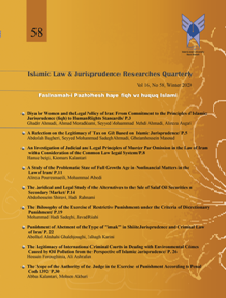An Investigation of Judicial and Legal Principles of Murder Par Omission in the Law of Iran with a Consideration of the Common Law Legal System
Subject Areas : Private lawHmzeh Baygi Harbagh 1 , Kumars Kalantari 2 *
1 - Student
2 - Teacher
Keywords: Criminal Liability, murder, Omission, causality, Intent,
Abstract :
Most jurisprudents believe that murder by omission gives rise to liability for the doer of the action in case of intent and with the assumption of capability. Jurisprudents have studied murder by omission (failure to act) under different rules of jurisprudence, such as the no loss principle, beneficence (Ihsan) and causation (Tasbib). There are, however, different comments on the issue. Despite developments and changes established in the law of Iran at different legal periods, there was no clear regulation regarding the criminal liability of the person who failed to act (Tarik), until by virtue of paragraph 1 of the unified article the law for the refusal to provide assistance to injured persons and to eliminate the risks of life in 1354, this issue was subject to legislative prediction; on the other hand, in 2013, pursuant to Article 295 of the Islamic Penal Code of 1392 and according to the present conditions in the aforementioned article, the person who failed to act is held to have criminal liability. In some countries, based on common law, the criminal liability of the person who refuses to act is relatively admitted; in countries under common law, omission is considered as a material element only when there is a legal requirement and responsibility to act and failure to act leads to the commitment of the crime.
2) انگلیسی
Fionda, J. (2000). Briefcase on criminal law. London: Cavendish Publishing Limited.
Horsey, K., Rackli, E. (2009), Tort law, New York: Oxford University Press.
Robinson, P. H. (1984). Criminal liability for omission, New York: Law School.
Samaha, J. (2001). Criminal law. U.S.A: Wadsworth.
Wayne, R. L. (2000). Criminal law. New York: West Group.
_||_Brandon, S. (1997). An overview of English penal law. (H. Mirmohammad Sadeghi, Trans.). Tehran: .
Clarkson, C. M. V. (1995). Analysis of the foundations of criminal law (H. MirMohammad Sadeghi, Trans.). Tehran: Shahid Beheshti University Jihad Publications.
Fionda, J. (2000). Briefcase on criminal law. London: Cavendish Publishing Limited.
Fletcher, G.P. (2005). Basic concepts of criminal law (S. M. Seyyedzade Sani, Trans.). Tehran: Razavi Islamic Sciences University Publication.
Foroughi, F., Bagherzadehgan, A., & Mirzaei, M. (2016). A judicial and legal analysis of obligatory-statutoryrules of omission based on the reference. Quarterly Journal of Jurisprudence and Islamic Law. 10(45), 89-114.
Ghourchi Beigi, M., & Hosseini, S.H. (2018). The study of the feasibility of the participation of the doer of the action and omission in the case of crime. Criminology and Criminal Law Studies.1.
Golpayegani, S.M.R. (1990). Majma al-Masaeil. Qom: Dar al-Qur'an Institute.
Habish Taflisi, A. (1992). Vojouh al-Qur'an. Tehran: Tehran University.
Haji Deh Abadi, A. (no date). Abandonment as a lethal act. no place: no publication.
Haji Tabar-Firouzjai, H., & Fallah, A. (2017). Reluctance mandate to murder and its documentation in Imamieh jurisprudence and Iranian Law. Quarterly Journal of Jurisprudence and Islamic Law, 13(4), 71-92.
Horsey, k., & Rackli, E. (2009). Tort law.New York: oxford University Press.
Hosseini Ameli, M.J. (No date). Miftah al-Karama. Beirut: Al al-Bait Institute.
Hosseini Shirazi, S.M. (No date). Al-Qasas Book. Qom: Dar al-Quran.
Kalantari, K.,& Shirzadi, F. (2014). Judicial and legal investigation of murdering arising from uncertainty in target with a view on Islamic Penal Code. Quarterly Journal of Jurisprudence and Islamic Law. 10(35), 79-96.
Kellini, A.J. (no date). Al-Khafi. Tehran: Dar al-Kotob al-Islamya.
Khoyi, S.A. (2007). The Foundations of takmalah al-Mannajj. Qom: Al-Amam al-Khuyi Publications.
Mansouri, S., & Afchangi, M. (2002). Assistance and assistance to others. Rescue Quarterly. 1(2) 81-106.
Marashi, M. (1995). New approaches to Islamic criminal law. Tehran: Mizan.
Mehrpour, H., Tafreshi, M.I., & Abdali, M. (2001). Legal enforcement of ethics. Moderator of Human Sciences. 5(4) 125-140.
Mirmohammad Sadeghi, H. (1392). Crimes against individuals: Tehran: Mizan.
Moosavi Khomeini, R. (1988). Tahrir al-Vasilah. (v4). Qom: Islamic Publications.
Moosavi Khomeini, R. (no date). Tahrir al-Vasilah. (v2) Qom: Dar al-Elm.
Mottaghi Ardakani, O., & Mojtahed. S. A. (2019). Inference of religious laws, and the proving of criminal proceeding in conflict of evidence: Similarities and differences. Quarterly Journal of Jurisprudence and Islamic Law 15(57) 179-202.
Musavi Bojnourdi, M.H. (1998). Al-Qawad Fiqahi. Qom: Hadi Publications.
Najafi, M.H. (1949). Javahar al-kalam fi sharh sharaya al-Islam: Tehran: Dar al-Kotob al-Islamiyah.
Peyk Herfeh, Sh. (1965). Scenario in some common world ethics consequences. Shargh newspaper, 90, 1-10.
Ravanan, A., Mirdadashi, S.M., Sadeghi, M., & Delshad Maaref, I. (2019). Civil liability causing medical team in Iranian and British laws. Quarterly Journal of Jurisprudence and Islamic Law, 15(57), 94-73.
Robinson, P. H. (1984). Criminal liability for omission. New York: Law School.
Safaee, S.H., & Rahimi, H. (2015). Civil liability (out-of-contract requirements).Tehran: Majd.
Samaha, J. (2001). Criminal law. U.S.A: Wadsworth.
Sanei, P. (1996). General penal law. Tehran: Ganj Danesh.
Tabarsi, A.A. (1994). Makarim al- Akhlagh. Beirut: Institute for the Study of Literature.
The Holy Quran
Wayne R. L. (2000). Criminal law. New York: West Group.
Yazdian Jafari, J. (2015). Investigation of the crime of refusing to assist people at risk. Journal of Medical Law, 31(8) 115-147.

